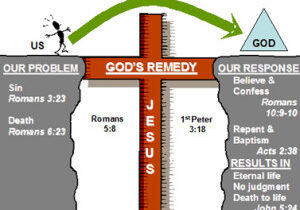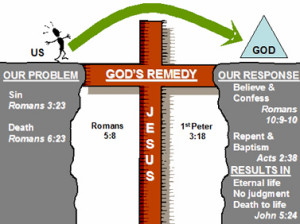Salvation: What is it Good for? Absolutely Nothing?
Why do you do what you do? How do you make a decision? If it is an important one perhaps you think it through, weigh the costs against the benefits. Do you try to forecast the outcomes and determine which course of action proves most useful, prudent, or profitable? Certainly this is the way we imagine we make decisions in the public sphere. In politics or corporate life the value of utility or profit defines the best course of action.
But how does one determine what is a cost and what is a benefit? Can you use the cost/benefit analysis to determine what you value? Emphatically- NO. At some point in the rational decision making process we all bump up against the irrational: is risk worth the profit? Is price worth the quality? Is pain worth the gain? No analysis can tell us the answer to these basic questions, because our actions and decisions are not rooted in rational reflection.
Recent work in philosophy and (oddly enough) neuropsychology has shown that the opposite is in fact the case: our thinking is undeniably dependent upon our action. Yet, this too is not a new understanding. The early Christians knew it all too well. Why would the Donatist controversy cause such a stir if the actions of priests did not affect their thinking or their faith? Satisfyingly, the way out of the dilemma is not an, “oh, their faith is what is important, not their actions:” but rather the truth that God is greater than either their faith or actions and will work regardless to save his people and creation. Similar emphasis on action in experience is given in the Didache which demands initiates live Christianly BEFORE they are baptized. Even as late as John Wesley, when he did not feel the love and faith he was preaching, he was encouraged by a spiritual director to “preach until he believed.” Experience determines thinking- not the other way around.
But now, in our post-Cartesian, post-Kantian world we have divested thought and experience — unwarrantedly giving the reins to reason. This posture has infiltrated our Churches where we now try to reason our way to faith by proving God’s existence, proving Jesus’ historical resurrection, proving young-earth creationism and then when the onus of evidence has been dealt with we make an altar call — we ask for a decision as if reason could show us the way forward. Once that decision is made and the sinner prayer prayed we declare the convert justified before God, add a name to our roster, pat them on the back, and send them out the door with a weekly appointment for small group. Is this what salvation means? Did God so love the world that he gave his only son so that we would reason things through for ourselves?
As John continues, there is no separation of deed and belief: “Light has come into the world, but people loved darkness instead of light because their DEEDS were evil […] But whoever LIVES by the truth comes into the light.” The experience of freedom from death, darkness, and evil is what forms belief. But what does this experience look like? Does it stop with the warm fuzzies of the altar call? Or is the altar call just one step of a long walk that stretches out both before and most certainly after we walk down that isle? Does not the experience of salvation come from the freedom to love well — one’s self, others, God, and his creation? Does it not come from the freedom to give oneself up to vulnerability? Does it not come from the freedom to live as though God has actually changed you?
I mean here, of course far more than the freedom to not sin. The Gospel is not a negative gospel. It does not simply offer a way to not hate, steal, or kill — rather it offers positive direction: the way to love, give, and bless. Any emphasis on being saved for life includes the fact of being saved from sin and death. An emphasis on being saved from death loses sight of being saved for life — which lies just beyond the horizon.
Thus, if salvation is going to mean anything, is it not going to manifest itself in our actions, our decisions, and our lives? If our lives look the same as they did before our supposed inclusion into the Body — then is that salvation not simply the impotent declarations of some other lord?
J.W. Pritchett
Latest posts by J.W. Pritchett (see all)
- Is the Internet Making us Ungodly? - April 21, 2014
- Does God Watch While You Have Sex? - March 17, 2014
- Lenten Love - March 3, 2014


